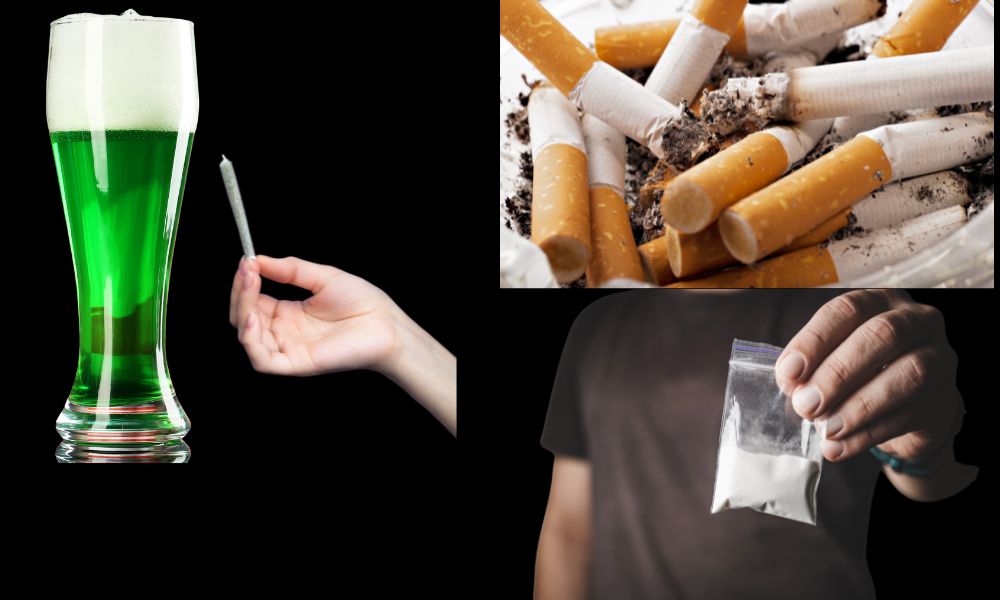Effective Resistance and Refusal Skills to Avoid Substance Abuse- When we talk about substance abuse, we talk about a problem that has become a big part of our understanding these days.
But do you know what substance abuse is? And how important are resistance and refusal skills to avoid this? Let us consider this topic in depth.
Substance abuse refers to the harmful or dangerous use of psychoactive substances, including alcohol, tobacco, drugs, or other substances that can harm a person’s physical and mental health.
This is a type of excess in which a person gets involved in excessive use of substances and his behavior becomes dependent on them.
To avoid substance abuse, the importance of resistance and refusal skills is no less. This skill protects the person from pressures that pull them toward substance use.
Using resistance skills allows a person to stabilize and strengthen their mind, while using refusal skills allows a person to establish boundaries around substance use. Thus, these skills help a person maintain a healthy lifestyle.
Understanding Substance Abuse

It is important to understand drug abuse so that we can address it. This includes a variety of substances such as alcohol, tobacco, marijuana, cocaine, and other drugs. Every substance has its own dangers and consequences, and understanding this helps a person stay away from its use.
The main types of drugs of abuse include alcohol, tobacco, marijuana, cocaine, heroin, and illicit drugs. Every substance has its own effect and its use can affect the physical and mental condition of a person.
It is important for a person to understand these types so that he can keep himself away from those substances and pave the way for living a healthy life.
There are many risks associated with the use of drug abuse. Excessive use of alcohol and drugs can lead to liver problems, heart disease, and mental problems.
Tobacco use increases the risk of cancer. Additionally, the problems associated with drug abuse are difficult to resolve and can impact a person’s relationships and quality of life.
Thus, we see that drug abuse is a serious problem and to avoid it it is extremely important to have effective resistance and refusal skills.
Next, we will talk about how these skills can be developed and how they can be used to fight drug abuse. (Effective Resistance and Refusal Skills to Avoid Substance Abuse)
Here is some additional information you may find useful:
Signs of drug abuse:
- Changes in behavior: The person may suddenly become irritable, angry, or sad.
- Social isolation: The person may withdraw from friends and family.
- Declining academic or professional performance: The person may be unable to concentrate in his or her studies or work.
- Financial problems: The person may have money problems or may start stealing money.
- Health problems: The person may have physical or mental health problems.
Effective Resistance and Refusal Skills to Avoid Substance Abuse
- The Role of Peer Pressure
- Developing Awareness
- Building Strong Foundations
- Learning Effective Communication
- Strategies for Refusal
- Managing Stress and Coping Mechanisms
- Understanding Consequences
- Seeking Professional Help
- Promoting Healthy Lifestyle Choices
- Enhancing Decision-Making Skills
- Implementing Positive Reinforcement
The Role of Peer Pressure

Pressure from friends, i.e. peer pressure, plays an important role in our lives. We face peer pressure when our friends or people in the society influence us to do or leave something. It is important to recognize this pressure so that we can make our decisions independently.
When our friends influence us to do something, we should understand whether, what our friends say is right for us or not.
At some times, pressure from our friends may be good for us, but at times it may also be harmful for us. Therefore, it is important for us to understand what kind of pressure our friends are exerting on us and in what direction we want to move.
Recognizing peer pressure:
Pay attention to your thoughts and feelings: When you’re with friends, are you able to express your thoughts and feelings freely? Or do you adapt to their thoughts and feelings?
Pay attention to your behavior: Do you do things you don’t normally do while you’re with friends? Or do you avoid doing things you enjoy?
Pay attention to your friends’ behavior: Do your friends pressure you to do certain things? Or do they push you to do things that could be harmful to you?
Effect of peer pressure:
Positive effect: Pressure from friends can also be positive at times. It can help you try new experiences, explore your abilities, and boost your self-confidence.
Negative impact: Peer pressure can also be negative. It can lead you to do wrong things, consume harmful substances and make wrong decisions.
Here are some tips that can help you choose the right group of friends:
- Choose friends who share your values and principles.
- Choose friends who influence you positively.
- Choose friends who inspire you and help you achieve your dreams.
Peer pressure is a normal part of life. It is important that you are able to recognize peer pressure, understand its impact and develop strategies to avoid it. (Effective Resistance and Refusal Skills to Avoid Substance Abuse)
You can also read on The Hidden Danger: How Alcohol Addiction Affects Mental Health
Developing Awareness
When we understand our instincts and personal circumstances, we are ready to escape pressure.
a. Recognizing Triggers:
An important part of developing your understanding and awareness is recognizing triggers or temptations.
Triggers are situations, people, or environments that draw a person toward substance use. It is important for us to recognize these triggers so that we can resolve them and stay away from substance use.
To recognize triggers, we must carefully observe the environment around us. At some time, in a particular situation or environment, we feel greed or we feel attraction towards those substances.
Therefore, we must understand our reactions and learn how to deal with them properly.
b. Understanding Temptations:
Understanding our tendencies or desires is also an important step in our spiritual development. Temptations or desires are those feelings that attract a person towards substance use.
It is important to understand these desires and deal with them properly so that we can avoid their influence.
To understand desires, we must look deep into our minds and understand what type of situation or emotion is pulling us toward substance use.
Furthermore, we must learn ways to strengthen our will power and intention so that we can resolve desires and stay away from them.
Triggers and temptations are major risk factors for substance use. Recognizing triggers and temptations and developing strategies to avoid them are important for avoiding substance use. (Effective Resistance and Refusal Skills to Avoid Substance Abuse)
Building Strong Foundations
To build a strong foundation, one must establish one’s self-esteem and personal boundaries.
Developing self-esteem is an important step, as it gives a person confidence in himself and helps him cope with pressure. Some tips to develop self-esteem:
Recognize and celebrate your positive characteristics and achievements.Challenge your negative thinking and talk to yourself positively. Don’t compare yourself with others. Accept and love yourself. Have confidence in your abilities. Establishing Personal Boundaries:
Personal boundaries are also important, in which a person remains limited within the circumstances around him and shows responsibility for his health.Some tips for setting personal boundaries:
Understand your needs and wants. Make it clear what your expectations are from others. Learn to say “no”. Stay away from those who violate your boundaries. Be firm in maintaining your boundaries.
To build a strong foundation, one must focus on developing one’s self-esteem and personal boundaries.
It is also important to note that:
Self-esteem and personal boundaries develop over time.There may be challenges in developing self-esteem and personal boundaries.It is important to get help to develop self-esteem and personal boundaries.
Self-esteem and personal boundaries help a person to cope with pressure, make healthy decisions and be successful in his life. (Effective Resistance and Refusal Skills to Avoid Substance Abuse)
From Crisis to Cure: Exploring the Powerful Solution to Stop Drug Abuse
Learning Effective Communication

It’s also important to practice positive communication and develop the ability to say “no.” When we express our thoughts in the right way, we can avoid pressure from others.
Practicing being positive is also an important step. When we show our dignity and express our opinions without shame, we establish our boundaries with others.
It is also important to develop the ability to say “no”. When we say “no” at the right time, we show responsibility for our health and safety and avoid pressure. In this way, by practicing these skills, one can protect oneself from substance abuse and maintain a healthy lifestyle.
Assertiveness training and learning to say “no” are important skills for avoiding substance abuse. By practicing these skills you can increase your self-confidence, set your boundaries and avoid pressure from others. (Effective Resistance and Refusal Skills to Avoid Substance Abuse)
Strategies for Refusal
There are also some strategies for refusal to help avoid substance use.
Offering Options:
When someone is attracted to substance use, it is very important to present them with an alternative. By offering a healthy alternative, a person can avoid substance use.
Example:
“I don’t want to drink alcohol, would you like to have tea with me?”
“I don’t want to smoke right now, would you like to go for a walk with me?”
Using Excuses Effectively:
Using excuses from time to time is also an effective method.
If a person feels under pressure, the person will not feel embarrassed in expressing his views.
Example:
“I have a headache, so I can’t go out tonight.”
“I have to get up early in the morning, so I can’t drink right now.”
It is important to remember that: There is no one “right” way to say no.
The most effective approach will depend on the situation and the person you are interacting with. It’s important to be firm in your refusal, but also to be polite.
Learning strategies for refusal is an important skill for avoiding substance use. By practicing these strategies, you can set your boundaries, avoid pressure from others, and remain free from substance use. (Effective Resistance and Refusal Skills to Avoid Substance Abuse)
Utilizing Social Support

Using social support is also an important step. When a person spends time with positive influences around him, he keeps his thoughts and behavior strong and stays away from substance use.
It’s also important to surround yourself with positive influences. When a person spends time with positive people, his nature also becomes positive and he avoids substance use.
Example:
- Spend time with friends who make healthy choices.
- Join groups that share your values and interests.
- Stay away from people who inspire you to use substances.
It is also important to seek help and guidance. Sometimes, the person seeks help and guidance in his or her loneliness, and uses social support for this.
Example:
- Talk to your family and friends.
- Talk to a counselor or therapist.
- Join a support group.
It is important to remember that you’re not alone. There are many people and organizations to help you avoid substance use. There is no shame in asking for help.
Social support is an important resource for avoiding substance use. By surrounding yourself with positive people, seeking help and guidance, and using other forms of social support, you can increase your chances of remaining free from substance use. (Effective Resistance and Refusal Skills to Avoid Substance Abuse)
Managing Stress and Coping Mechanisms

It is also important to control stress and use coping measures so that a person can keep his state of mind stable and calm.
a. Stress Reduction Techniques:
Using some techniques to control stress is important for our health and prosperity. To reduce stress, we can do some pranayama and meditation.
Pranayam, such as Anulom Vilom and Bhramari, help in reducing our stress and our mind becomes calm and stable. By meditating, we can keep our mind calm and our mind stable and balanced. Apart from this, exercise and yoga are also effective ways to reduce stress.
b. Healthy Solution Strategies:
Using healthy coping strategies is an important step in our lives. When we look for solutions to problems, we should take care of our physical and mental health.
For this, we should include nutritious food in our daily routine and use natural therapies. Also, we should try to bring positive changes in our behavior and practice yoga and meditation to keep our mind balanced and stable.
All these healthy coping strategies help in relieving us from stress and make our life happy and prosperous. It is also important to note that managing stress and using coping strategies requires time and effort.
You may face challenges in using these strategies. It is important to get help to control stress and use coping measures.(Effective Resistance and Refusal Skills to Avoid Substance Abuse)
Understanding Consequences
It is also important to understand the consequences, whether they are short-term or long-term effects. By learning from mistakes, a person is able to make better decisions for their future and avoid substance use.
a. Short Term vs Long Term Effects:
Understanding consequences intelligently helps clarify our decisions. There is a difference in short-term and long-term consequences. In short-term results, the person feels the effects immediately, while in long-term results, the effects become visible gradually.
Therefore, a person should understand the short-term and long-term impact of the consequences of his decisions, so that he can make the right decision and improve his future.
Example:
Short-term effects: Drinking alcohol can make you feel instantly happy and euphoric.
Long-term effects: Drinking alcohol can have negative effects on your health, relationships, and career.
b. Learning from past mistakes:
Learning from mistakes is an important part of our growth. When we learn from our past mistakes, we are able to make better decisions for our future. By learning from past mistakes, we understand how to improve our thoughts and actions and develop ourselves further.
Therefore, a person should try to move forward by learning from his past mistakes and strive towards creating better conditions in his life.
Example:
Mistake: If you have missed an important event due to substance use in the past, you may decide to avoid substance use in the future.
Learning: You can learn from your mistakes and make plans to avoid substance use in the future.
Understanding consequences and learning from mistakes are important skills to avoid substance use. By practicing these strategies, you can learn from your mistakes, make better decisions, and stay free from substance use. (Effective Resistance and Refusal Skills to Avoid Substance Abuse)
Seeking Professional Help
The last challenge is that one must utilize support circles and resources in which the individual can seek social support and help. Consulting a mental health expert is also an important solution.
Through counseling and therapy, a person can solve problems by expressing his thoughts and feelings. Here are some Counseling and Therapy options:
Individual therapy: This is a type of therapy in which a person works on his problems with a therapist.
Group therapy: This is a type of therapy in which a person works on his problems with other people in a group.
Family therapy: This is a type of therapy in which a person works on his problems with his family members.
It’s also important to utilize support groups and resources. In this the person understands his problems and can get support from others. Here are some support groups and resources:
Alcoholics Anonymous (AA): This is a support group for people struggling with alcohol addiction.
Narcotics Anonymous (NA): This is a support group for people struggling with drug addiction.
Al-Anon: This is a support group for people who live with an alcoholic.
National Institute on Drug Abuse (NIDA): This is a government organization that provides information and resources related to substance abuse.
Substance Abuse and Mental Health Services Administration (SAMHSA): This is a government agency that provides information and resources related to substance abuse and mental health problems.
Using support circles and resources is an important strategy for avoiding substance use. Using these strategies you can connect with others, get help, and stay free from substance use. (Effective Resistance and Refusal Skills to Avoid Substance Abuse)
Promoting Healthy Lifestyle Choices

Promoting a healthy lifestyle is also an important step. The individual should be encouraged to lead a healthy and positive lifestyle, which includes participating in physical activities, eating nutritious foods, and pursuing recreational hobbies or interests.
a. Participating in physical activities:
The importance of participating in physical activities is extremely important for our health and prosperity. Exercising makes our body strong and also maintains our mental balance.
In addition, exercising increases blood circulation in our body, which facilitates oxygen supply to our heart and other body organs and makes our body feel relaxed.
Exercise has many benefits such as weight control, reducing stress, helping to boost self-confidence, and helping to strengthen mental health.
There are different types of exercise such as running, cycling, yoga, and pranayam. By making exercise an important part of our daily routine, we can keep our lives healthy and happy.
b. Pursuing Hobbies and Interests:
Taking home our hobbies and interests is an important part of our lives. When we give time to our interests and hobbies, our mind remains calm and happy. Hobbies like painting, singing, dancing, or gardening make our life lively and colorful and keep our mind balanced.
Giving time to our interests and hobbies helps in relieving our mind from stress and makes our life joyful. Apart from this, interests are also a medium to express our thoughts, which helps in our internal and external development.
Therefore, we should keep our mind balanced and happy by including interests and hobbies in our life.
Thus, when a person uses these strategies and remedies properly, he can save himself from substance abuse and pave the way to living a healthy and happy life. (Effective Resistance and Refusal Skills to Avoid Substance Abuse)
Enhancing Decision-Making Skills
It is time to further improve your abilities while making decisions. To make the right decision, one must understand one’s options and challenges. It is also important to evaluate the risks and benefits.
When we consider a decision, we must understand what consequences it may have and what benefits it may bring.
Establishing clear goals and priorities is also an important step. When a person clearly understands his goals, he does not fail to cope with his pressures.
Implementing Positive Reinforcement
The impact of positive praise is also important. When a person appreciates his successes, he motivates himself for further progress.
Dedication is also important for success. When a person recognizes his contribution and takes pleasure from it, he gives himself more courage.
Learning from challenges is also an important step. When a person learns from what he has done, he can make himself stronger and do the job better the next time. (Effective Resistance and Refusal Skills to Avoid Substance Abuse)
Exploring Facts and Stats
Substance abuse is a serious problem in the United States, impacting millions of people and their families.
Fortunately, research shows that effective resistance and refusal skills can significantly reduce the risk of substance use among youth and young adults. (Effective Resistance and Refusal Skills to Avoid Substance Abuse)
Here are some key facts and statistics to consider:
- Prevalence of Substance Use:
- According to the 2021 National Survey on Drug Use and Health (NSDUH), over 20.4 million people aged 12 or older in the US had a substance use disorder (SUD) in the past year.
- Marijuana is the most commonly used illicit drug (43.5 million past-year users), followed by cocaine (15.7 million) and hallucinogens (13.1 million). (https://www.samhsa.gov/data/data-we-collect/nsduh-national-survey-drug-use-and-health)
- Importance of Refusal Skills:
- Studies have shown that teens with strong refusal skills are less likely to initiate substance use.
- A 2014 meta-analysis found that social resistance strategies (e.g., saying “no,” offering excuses) were effective in preventing substance use. (https://www.ncbi.nlm.nih.gov/pmc/articles/PMC3076702/)
- Programs and Resources:
- Numerous evidence-based programs teach youth effective resistance skills.
- The National Institute on Drug Abuse (NIDA) provides resources and information on preventing substance use in teens. (https://www.nih.gov/about-nih/what-we-do/nih-almanac/national-institute-drug-abuse-nida)
Conclusion
Effective Resistance and Refusal Skills to Avoid Substance Abuse- In this article we saw what substance abuse is and how it can be avoided.
We looked at how effective resistance and refusal skills can protect a person from the pressures of substance use and how they can be used.
Finally, we encourage you to practice effective resistance and refusal skills and apply them in your life. With this you will keep yourself away from substance abuse and live a healthy and happy life.
I hope you have liked the information we have shared in our article, to know more about this you can read our other article too.
Frequently Asked Questions
What are resistance and refusal skills in the context of substance abuse prevention?
Resistance and refusal skills are strategies and techniques individuals use to say no to substance use and resist peer pressure to engage in unhealthy behaviors.
Why are resistance and refusal skills important?
Resistance and refusal skills empower individuals to make healthy choices and avoid substance abuse by enabling them to assertively decline offers or invitations to use substances.
How can one develop effective resistance and refusal skills?
Effective resistance and refusal skills can be developed through practice, education, and awareness-building activities that enhance self-confidence and assertiveness.
What are some common triggers that may lead to substance abuse?
Common triggers for substance abuse include stress, peer pressure, emotional distress, boredom, curiosity, and exposure to social environments where substance use is normalized.
How can individuals identify and avoid peer pressure related to substance use?
Individuals can recognize peer pressure by being aware of situations where they feel pressured to engage in substance use, and they can avoid it by setting boundaries, communicating assertively, and surrounding themselves with supportive peers.
What are effective communication techniques to refuse substance use?
Effective communication techniques include using clear and assertive language, providing reasons for refusal, offering alternatives, and staying firm in one’s decision to abstain from substance use.
How can stress management contribute to resisting substance abuse?
Managing stress through healthy coping mechanisms such as exercise, relaxation techniques, and seeking support can help individuals cope with challenging situations without resorting to substance use.
What are the short-term and long-term consequences of substance abuse?
Short-term consequences may include impaired judgment, health risks, legal problems, and strained relationships, while long-term consequences may include addiction, chronic health conditions, and negative impacts on overall well-being.
When should individuals seek professional help for substance abuse?
Individuals should seek professional help if they experience difficulty controlling substance use, face negative consequences, or if substance use interferes with daily functioning, relationships, or mental health.
How can promoting healthy lifestyle choices help prevent substance abuse?
Engaging in activities such as regular exercise, pursuing hobbies, maintaining a balanced diet, and fostering social connections can promote overall well-being and reduce the likelihood of turning to substance use as a coping mechanism.